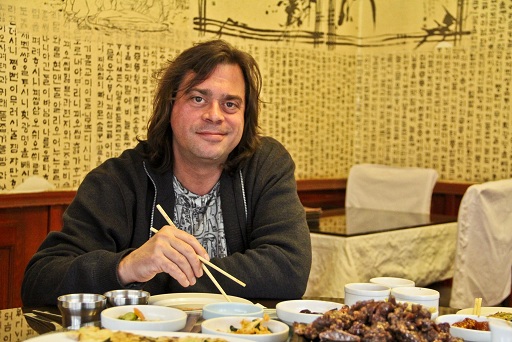
Nada Badawi
It has been a rough week. No two ways about it. After my recent musings about what it is that I am supposed to be doing as a food critic, I was all set to put that into play and was looking forward to venturing out, discovering some new places to eat, and writing about them. But then the weekend came, politics intervened, and I found that I could take no pleasure in the thought of it.
To many, food seems a trivial subject. Even on a personal level, we all have friends or family members who take no notice of what they eat—as long as it is familiar. They eat to live. Fuul is fuel. They eat when they are hungry, they don’t when they are not, and even when they do, it is an indifferent exercise: a roasted chicken might be described as “good,” or baby beets as “bad,” but that is the end of it. No moans of pleasure; no eyes rolling in rapture; no effort to seek out new tastes and new culinary experiences.
Even for foodies—who live to eat—food, as seriously as they take it, is still but one of life’s simple pleasures; and we have been called elitists and snobs (perhaps rightly so) because those five-star meals do not come cheap.
Even devotees of the Slow Food movement, which prides itself on the organic and the locally-sourced, sometimes have the tendency to get so caught up in the search for the perfect heirloom tomato that they forget that many people don’t have any tomatoes at all. They forget that whatever else it is—a source of nourishment, identity, pleasure and love—food is also and always has been political.
Cooking, arguably, is what sets humans apart from other animals. We alone learned to control and use fire and to share our food. It was communal and co-operative and there was a high degree of equality. We all ate the same. But this was back in the day when we were still hunting and gathering.
When we learned to farm, everything changed. With the invention of agriculture came a dramatic increase in the population and the glories of the first civilisations such as ancient Egypt, but with agriculture came the origins of poverty, hunger, inequality, patriarchy, slavery and oppression as well. It was the greatest mistake humans ever made. And now, 10,000 years later, here we are, fighting for survival.
Food is indeed one of life’s simple pleasures, but let’s not forget that many a regime has faltered due to its inability to keep its people properly fed—and that many others have used food as a weapon against its people.
I remember well last year on the Friday of Rage when protestors near me were waving aish baladi and chanting “Bread and Water! Bread and Water!” I recall as well that one of the first businesses to be looted was Carrefour. Food, far from being a trivial subject, is often at the centre of historical change.
Think of world food prices. Is it merely a coincidence that at the beginning of 2011 the Food Price Index, which is calculated monthly by the FAO (Food and Agriculture Organisation of the United Nations), was at an all-time high? To what extent was this responsible for the Arab Spring?
The riots that took place in Cairo in 1077 are popularly known as the “Bread Riots.” We would do well not to forget that, as we argue about things like censoring the internet or closing shops early or even the precise nature of the relationship between various branches of the government. Sometimes events get away from us while we are distracted, arguing about things that in hindsight turn out to be a lot more trivial than food.
Let us not forget that the power of the pharaohs was built upon their ability to control the grain supply; that the Romans invaded and conquered this country in order to have enough wheat to ship back to the poor of Italy; that when the Portuguese discovered a route to India, the Mamluk government went into decline as a result of the sharp drop in revenues as a consequence of losing control of the spice trade; that, indeed, throughout history governments have risen and fallen as a consequence of that entertaining but trivial subject food.



